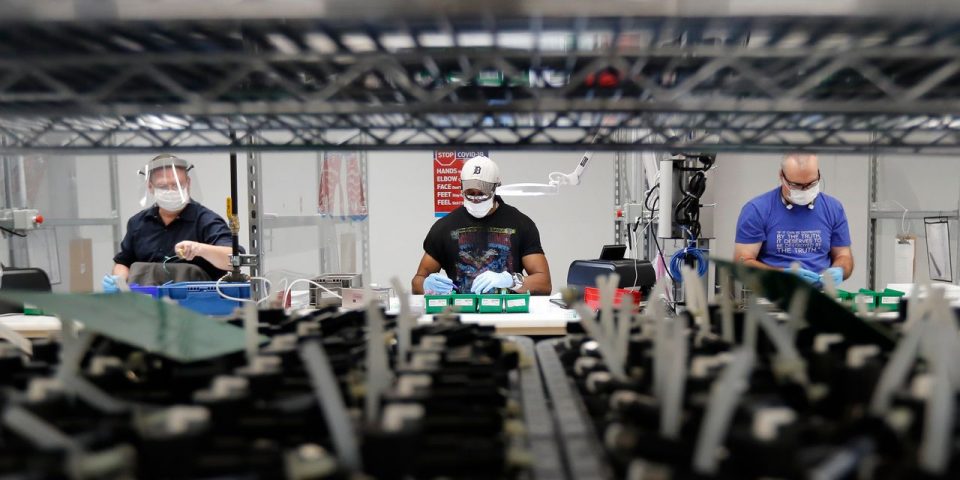Manufacturers across North America are reopening factories with their supply chains hobbled. Some U.S. factories report shortages and delivery delays of critical components, the WSJ’s Bob Tita and Austen Hufford report, while others say they are already overwhelmed by orders for items in high demand and are looking for alternative suppliers to compensate for plants that remain closed. Production remains troubled at many open factories, with companies saying that new protective equipment and procedures to protect against coronavirus infections will curtail efficiency and production. The bigger issue across industrial sectors is that supply chains fractured in abrupt lockdowns in March are still staggering. Some companies say that’s left them unable to take advantage of markets with more resilient demand. Those that are getting up to speed are focused on minimizing risks. Pennsylvania-based Littlestown Foundry Inc., for instance, is stockpiling more aluminum ingots than usual because deliveries have been less reliable.
ECONOMY & TRADE
U.S. international trade flows are falling at a historic pace that’s likely to cascade across the country’s supply chains for weeks to come. American exports and imports both fell at the steepest monthly rates on record in April, the WSJ’s Harriet Torry reports, and the decline hit U.S. exporters the hardest. Imports of goods and services fell 13.7% in April from March, while exports dropped 20.5%, according to the Commerce Department, the largest declines since record-keeping began in 1992. Excluding services, exports of goods dropped 25.2% from March while imported goods declined 13.6%, highlighting the upheaval in global markets under coronavirus pandemic lockdowns. Shipping operations are feeling the impact, with volumes through major U.S. ports sliding. Still, Angeliki Frangou, chief executive of container ship operator Navios Maritime Containers LP, hopes for an upturn in the second half of 2020, saying, “Much of the disruption may have already occurred.”
SUPPLY CHAIN STRATEGIES
Hedging has become a critical tool for companies seeking to weather disruptions in food supply chains during the coronavirus pandemic. Grocers, food manufacturers and restaurant chains have been leaning on the financial mechanism, the WSJ’s Nina Trentmann and Kristin Broughton write, as shipments from suppliers have wavered because of shutdowns at meat processing plants and prices have fluctuated wildly. Locking in prices weeks or months ahead carries risks, but for companies like
Costco Wholesale Corp.
and
Jack in the Box Inc.
hedging has helped bring more certainty over costs amid rapid changes in product availability and pricing. The hedging is similar to what many companies do with currencies and oil, but the big leaps in food markets have raised the stakes this spring.
Hormel Foods Inc.
says the key is to strike a balance between contracted prices, market prices and the company’s own projected operating costs.
QUOTABLE
“
The container takes twice as long to unload.
”
Number of the Day
27.7%
Annual decline in carload volumes for U.S. railroads in May, according to the Association of American Railroads.
IN OTHER NEWS
The number of U.S. workers receiving unemployment benefits increased slightly to 21.5 million at the end of May. (WSJ)
South Korea’s exports fell 24% in May after dropping 25% in April. (WSJ)
signed agreements aimed at broadening global distribution of a coronavirus vaccine being developed by Oxford researchers. (WSJ)
Several U.S. passenger airlines are partially restoring flights as parts of the country emerge from lockdowns. (WSJ)
China agreed after pressure from Washington to allow U.S. and other foreign airlines to restore some China routes. (WSJ)
Car-parts supplier APC Automotive Technologies Inc. filed for bankruptcy protection with plans to hand ownership to lenders. (WSJ)
The owner of women’s clothing retailer New York & Co. Stores says it may have to file for bankruptcy. (WSJ)
The British unit of Victoria’s Secret owner L Brands Inc. filed for protection from creditors. (WSJ)
India’s automakers are facing parts supply constraints as they reopen factories. (Nikkei Asian Review)
Retailer G-III Apparel Group Inc. is closing nearly 200 stores to focus on wholesale business for its major brands. (Sourcing Journal)
Transportation groups are concerned a proposed $494 billion highway bill released by Democrats doesn’t have bipartisan support. (Roll Call)
Amazon Air will add 12 767-300 freighters to its fleet under a leasing arrangement with
Air Transport Services Group Inc.
(Air Cargo News)
Three
Amazon.com Inc.
warehouse workers are suing the company, alleging that working conditions put them and their families at risk of Covid-19 infection. (Bloomberg)
Sports apparel supplier
is opening a distribution center in Whitestown, Ind., its second in the U.S. (Supply and Demand Chain Executive)
Associated Wholesale Grocers Inc. will build a heavily-automated distribution center in Hernando, Miss., south of Memphis, Tenn. (Progressive Grocer)
Tanker giant Frontline is launching a share sale aimed at raising $100 million. (Lloyd’s List)
FedEx Corp.
named Karen Reddington president of its European express business and chief executive at TNT. (The Loadstar)
Volga-Dnepr is suing
Boeing Inc.
over the manufacturer’s refusal to deliver four freighters after the cargo airline sought to revive its canceled orders. (Lloyd’s Loading List)
ABOUT US
Paul Page is editor of WSJ Logistics Report. Follow the WSJ Logistics Report team: @PaulPage, @jensmithWSJ and @CostasParis. Follow the WSJ Logistics Report on Twitter at @WSJLogistics.
Write to Paul Page at [email protected]
Copyright ©2020 Dow Jones & Company, Inc. All Rights Reserved. 87990cbe856818d5eddac44c7b1cdeb8


